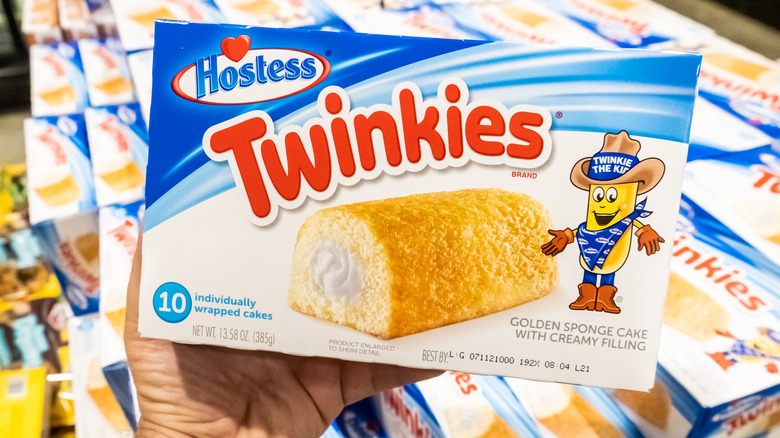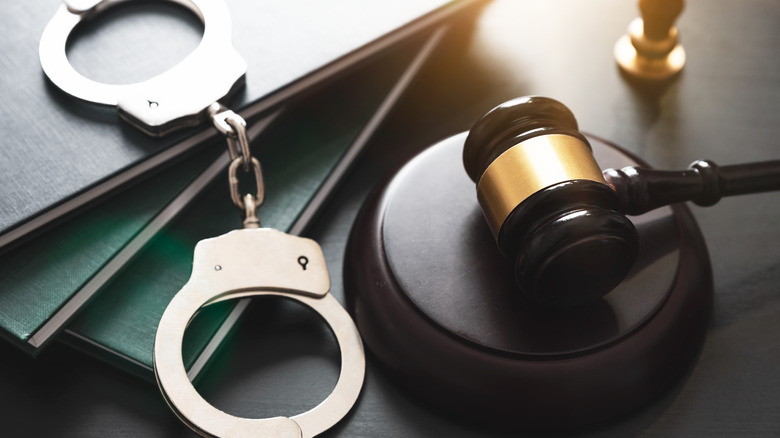The Truth About The Twinkie Defense
In the court of law, those charged have the right to present a defense to their case. There are common criminal defenses that are used, such as insanity, self-defense, or duress, but there have also been recorded cases wherein unusual defenses were laid out. For instance, the Matrix defense was used in a 2012 case where Tonda Lynn Ansley shot her landlord, as she claimed that she was brainwashing her. "They commit a lot of crimes in 'The Matrix.' that's where you go to sleep at night and they drug you and take you somewhere else then they bring you back and put you in bed and, when you wake up, you think it's a bad dream," Ansley said (via CNN). And surprisingly, the argument worked, and Ansley was found not guilty.
One of the most unusual defenses ever heard is the Twinkie defense. It was used in the case of Dan White, who killed politicians George Moscone and Harvey Milk in 1978. White worked as a supervisor with San Francisco's Mayor Moscone but resigned. He changed his mind, however, and wanted his job back, only to find out that the position had been filled on the prodding of Milk and others. Per Biography, White went to the City Hall and shot Moscone and Milk multiple times. Both men died of their injuries. White's attorneys used what we now know as the Twinkie defense, a term dubbed by the media.
Misconceptions about the Twinkie defense
Most people think that Dan White's defense team argued that White ate too many Twinkies, which led him to commit the crimes. However, that's not the case at all. In fact, Twinkies were quite insignificant during the trial. The actual defense used was that White had untreated depression and was incapable of distinguishing right from wrong when the incident occurred, as reported by Snopes During the trial, psychiatrist Martin Blinder was brought to the stand to testify regarding White's mental state. The doctor said that White — who was normally a healthy eater — resorted to eating junk food, such as Twinkies and Coke, before the incident occurred, which proves he was depressed. He also stopped shaving his beard and neglected his wife, further providing evidence of depression. Ultimately, White's defense never said that he did the crime because he ate Twinkies. Instead, binge-eating junk food was mentioned to prove that he had depression.
In the end, Dan White was convicted of manslaughter instead of first-degree murder. Despite not being the focus of the defense team, the term Twinkie defense blew up and became popular, mostly because of the media and the misconceptions surrounding the criminal defense that was used. The junk food that was mentioned in passing throughout the trial has now made Dr. Martin Blinder famous for inventing the Twinkie defense, according to the San Francisco Chronicle.
What the Twinkie defense means today
Today, Twinkie defense is the umbrella term used for unusual defense arguments used in court. The meaning has evolved throughout the years since its introduction in Dan White's case. Now, a Twinkie defense means that the defendant had diminished mental capacity during the time the crime was committed. As reported by The Crime Report, the term is used wherein a defendant puts the blame on the substance ingested while committing a crime.
Since the term became popular, a few cases have resorted to the Twinkie defense. In 2012, bus driver Kenneth Sands molested several girls and claimed diminished capacity due to his high intake of caffeine, which led to his behavior. In another case, Dr. Louis Chen was charged with murdering his family, and his legal team claimed that self-medication combined with his excessive intake of cough syrup caused him to commit the crimes (via Attorney at Law Magazine). In both of these cases, the Twinkie defense didn't help and both were found guilty of their crimes.


